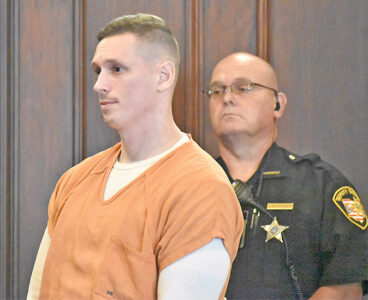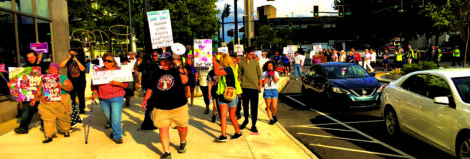Columbus killings decried at Youngstown vigil
Youngstown demonstration calls for justice in 2 police shootings

Correspondent photo / Sean Barron The Rev. Abby Auman, the Mahoning Valley United Methodist Churches organization’s district superintendent, makes her feelings known about the police killing of two black men in the Columbus area, during a vigil Sunday afternoon on the Mahoning County Courthouse steps.
YOUNGSTOWN — Systemic racism and the continued unjustified killing of black men by white police officers still tear at the fabric of society, but the difference people of goodwill can make begins with speaking against both, several students say.
“When you see a wrongdoing and do nothing about it, you’re being a silent witness,” Lekeila Houser, a Youngstown State University senior and Mahoning Valley Sojourn to the Past member, said. “These men were wrongfully killed by those who are supposed to protect us.”
Houser was referring to Casey C. Goodson Jr., 23, and Andre Maurice Hill, 47, two black men whom two white police officers shot to death this month in the Columbus area. Hill and Goodson also were honored during a vigil that Mahoning Valley Sojourn to the Past hosted Sunday afternoon on the Mahoning County Courthouse steps.
Five other black males who died at the hands of law enforcement in or near Columbus during the past four years also were remembered: Henry Green, 23, killed in June 2016; Tyre King, 13, September 2016; Kareem Ali and Nadir Jones, both 30, July 2017; and Julius Tate Jr., 16, December 2018.
Goodson was shot in the back Dec. 4, as he returned to his grandmother’s home from the dentist and a fast-food restaurant, by Jason Meade, a Franklin County sheriff’s deputy and pastor of Rosedale Free Will Baptist Church in Irwin, about 30 miles west of Columbus. Meade was working with the U.S. Marshals Fugitive Task Force to search for violent offenders, though the target was not Goodson, who had no criminal record and whose killing led to a series of protests in downtown Columbus.
Meade’s accusers pointed to a speech he delivered at a 2018 Ohio State Association of Free Will Baptists convention, in which he appeared to advocate misconduct. In a recording, Meade reportedly told his audience, “I hunt people – it’s a great job, I love it. … I learned long ago I gotta throw the first punch. Don’t look up here like, ‘Oh, police brutality.'” People, I hit; you wish you could hit, trust me.”
Police contend Goodson had pointed a gun at the deputy. The U.S. Attorney’s office of Southern Ohio is conducting a civil rights investigation.
Hill was killed Tuesday after Adam Coy and another Columbus police officer responded to a nonemergency disturbance call from a neighbor about a man sitting for an extended amount of time in a vehicle with its engine on and off before it was later determined Hill was a guest at the residence.
He reportedly exited the garage holding a raised cellphone in one hand and the other in his coat pocket before Coy fired at the unarmed Hill about 10 seconds after their encounter. Coy’s body camera reportedly showed at least six minutes had passed before aid was rendered, according to the Columbus Dispatch.
Neither Coy nor the other officer activated their devices, though video of the shooting was available because the cameras have a 60-second “look back” feature, but no audio until they’re turned on, the article stated.
Also speaking at Sunday’s 45-minute Youngstown vigil at which an estimated 50 attended was Brittany Bailey, a YSU student and Mahoning Valley STTP member who criticized Ohio Senate Bill 175, which passed the General Assembly this month. The legislation, which includes a “stand-your-ground” amendment, would allow armed citizens to shoot someone if they feel they’re in fear of harm and deadly force is necessary, and are determined to have been some place they were lawfully permitted to be.
Ke’Lynn Dean, a YSU freshman, recalled having seen the film “Fruitvale Station,” a 2013 drama that depicts events leading to the death of Oscar Grant III, a black man who was killed by a Bay Area Rapid Transit police officer Jan. 1, 2009, in Oakland, Calif., after he and several friends had been detained.
“In 2020, we still have the same problem,” he said.
White people frequently view police as heroes and protectors, yet black people are arrested and incarcerated disproportionately, said Meri Johnston, a STTP member. Too often, many black people face systemic racism also as they try to seek redress and justice, she added.
“I’m really tired of having these conversations, and I’m really tired of coming to these vigils. This is getting old and tired,” said Jaladah Aslam, the Youngstown/Warren Black Caucus’s president, who added that blacks killed by police are more than statistics and should be remembered for how they lived.
Many police unions have special provisions in their contracts that give them added power and make them less accountable for their members’ actions, Aslam continued.
Fighting systemic racism, which plagues too many communities, also means focusing on justice for victims’ families. In addition, such efforts must include advocating for police reforms, the Rev. Kenneth L. Simon, pastor of New Bethel Baptist Church in Youngstown, said.
Anchoring much racism in society are local and national policies that allow entities that support police unions to make money from police brutality, for example, noted Youngstown City Councilman Julius Oliver, D-1st Ward.
Natalia McRae, an East High School senior, outlined a call to action that includes having Youngstown police officers be equipped with body cameras, calling Columbus authorities to demand charges be brought against Coy and Meade, and nonviolently intervening when an injustice occurs.
“Not to speak is to speak; not to act is to act,” she said.
McRae noted that she was part of a petition asking Youngstown City Schools Chief Executive Officer Justin Jennings to eradicate racism if it’s found in the curriculum or classroom culture. In addition, she took part in about 30 workshops this year in which more than 1,000 people learned about the effects racism has had on people of color since the 1600s.
news@tribtoday.com




